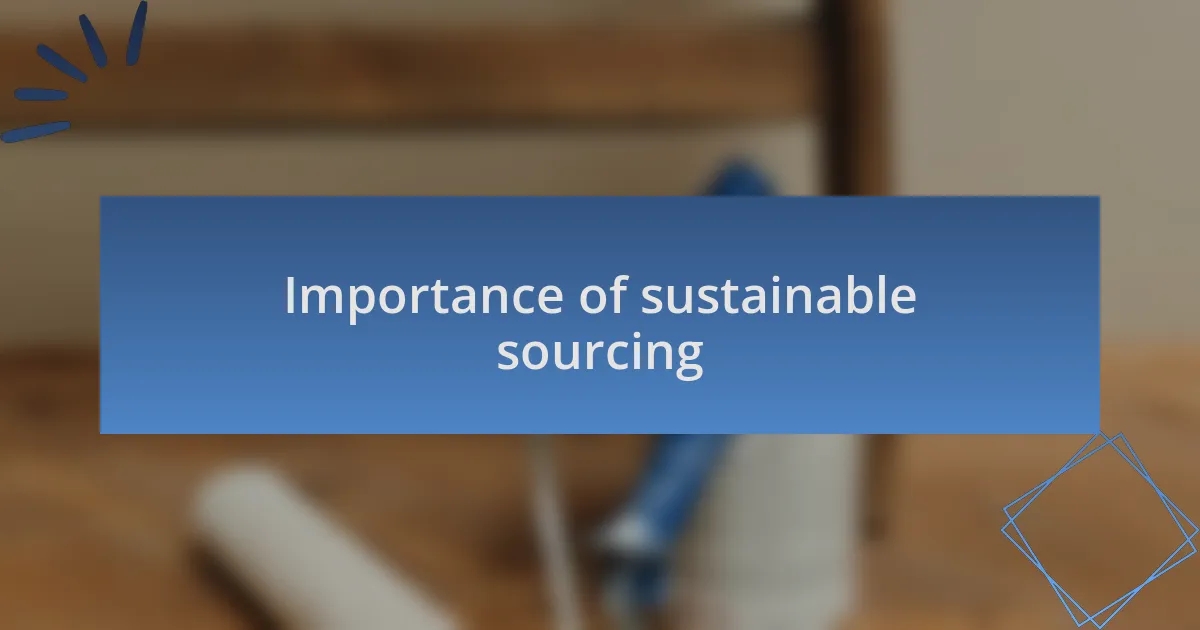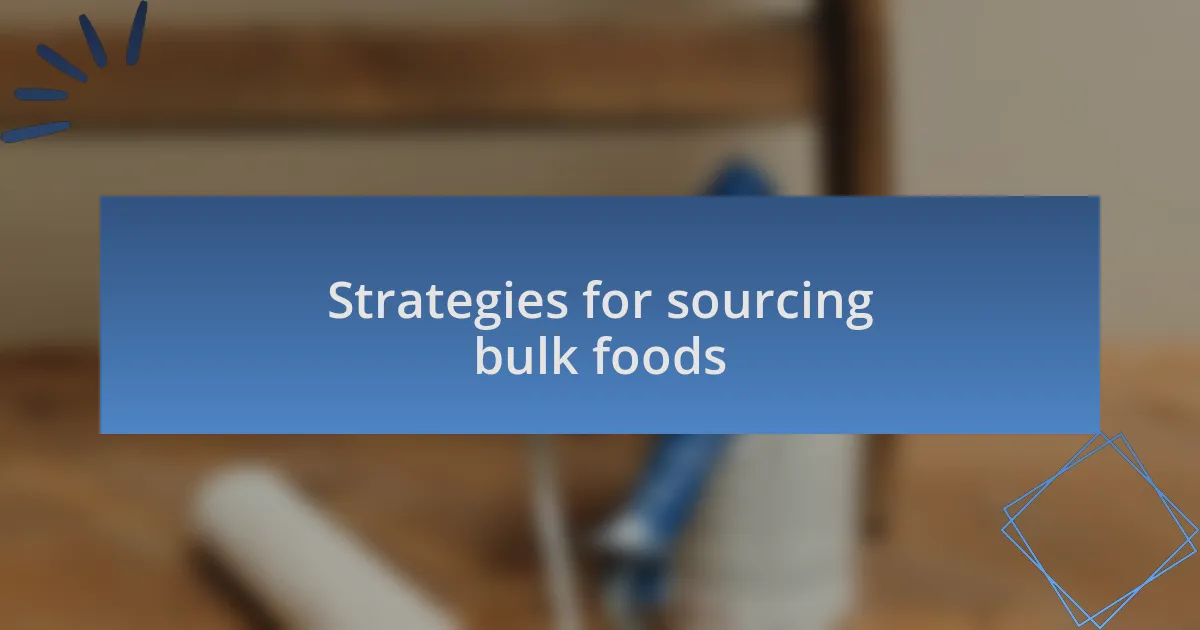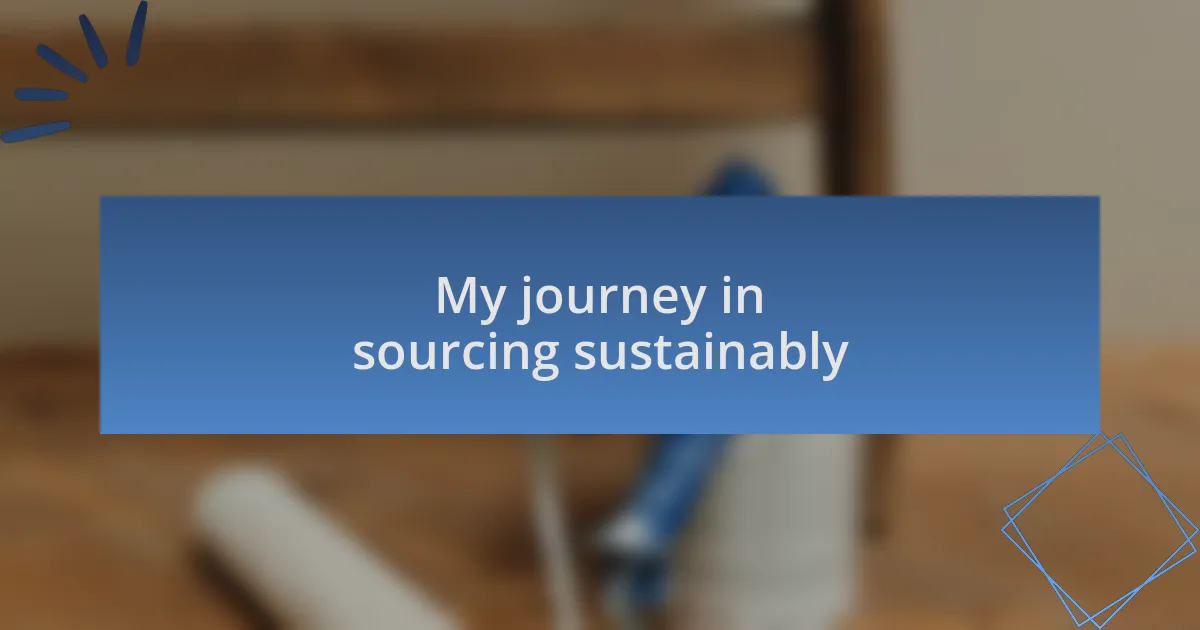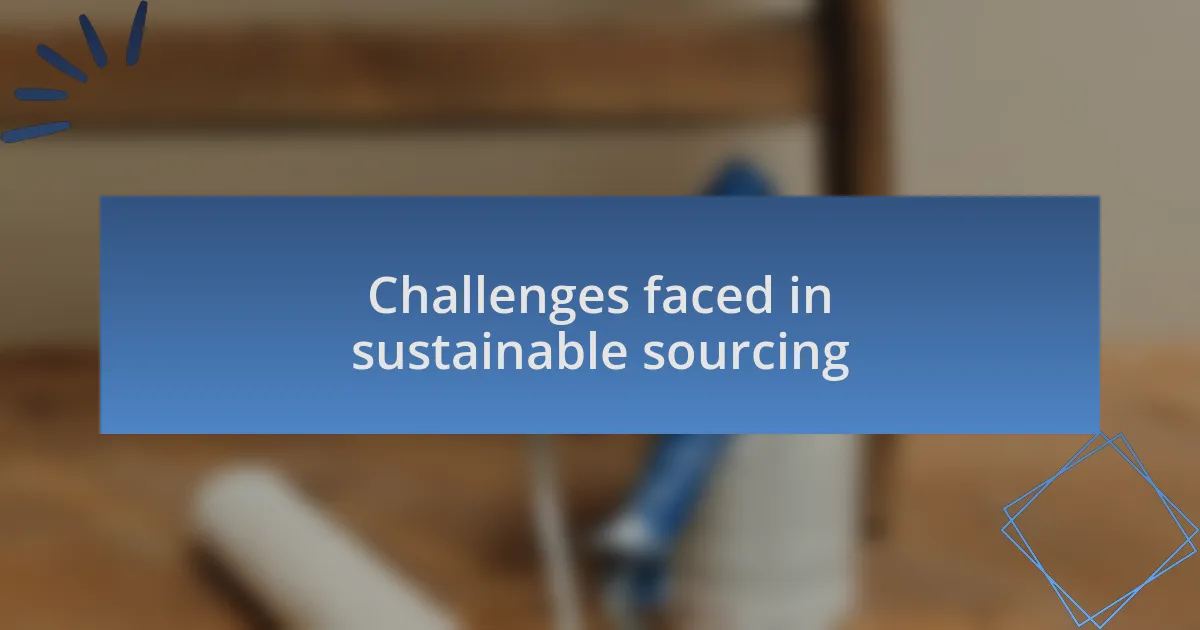Key takeaways:
- Handcrafted goods reflect artisans’ skills and stories, adding emotional value compared to mass-produced items.
- Sustainable sourcing fosters connections with local farmers, supporting both environmental health and community resilience.
- Buying in bulk offers financial savings, reduces packaging waste, and encourages exploration of diverse ingredients.
- Challenges in sourcing sustainably include finding reliable suppliers, fluctuating prices, and considering transportation impacts.

Understanding handcrafted goods
Handcrafted goods embody a unique spirit, reflecting the skill and passion of artisans. I still remember the first time I held a hand-carved wooden bowl; it wasn’t just a bowl, but a piece of someone’s story, their creativity, and hard work infused into each curve. Isn’t it fascinating how a handmade item can evoke emotions and memories while mass-produced products often feel cold and impersonal?
When we talk about handcrafted goods, we uncover layers of culture and tradition. I once spoke with a potter who described how her work connected her to her ancestors, each piece grounded in history. As I listened, I couldn’t help but feel the weight of her legacy; it made me wonder – how many stories are hidden in the objects we use every day?
The beauty of handcrafted goods lies in their imperfections, which remind us that they are made by human hands. I have a favorite mug adorned with a slightly crooked handle; every sip from it feels warmer because I know it was made with love. Isn’t it these little quirks that add character, making handcrafted items not just possessions, but beloved companions in our daily lives?

Importance of sustainable sourcing
Sustainable sourcing goes beyond environmental responsibility; it nurtures our connection to the planet. I remember the moment I discovered that my favorite bulk grains were sourced from local farms practicing organic and regenerative agriculture. The idea that my choices could support these eco-friendly methods filled me with purpose. Isn’t it empowering to know that each meal can contribute to a healthier Earth?
When I think about sustainable sourcing, I also reflect on the impact of supporting small-scale farmers versus industrial operations. There’s something profoundly satisfying about knowing the people behind my food. I can still picture the farmer I met at a market, sharing stories about his soil health practices. It highlighted for me how our purchasing decisions can forge relationships, making each bite not just a meal, but a meaningful connection.
Moreover, sustainable sourcing fosters community resilience. I noticed how a local co-op not only provides organic products but also serves as a hub for educational workshops on sustainability. Each class I attended deepened my appreciation for the environmental ramifications of our choices and nurtured a sense of belonging. How often do we realize that our daily habits, like sourcing food sustainably, can actually strengthen our communities?

Benefits of bulk food purchasing
Purchasing bulk foods can lead to significant savings, both financially and environmentally. I distinctly remember the first time I weighed out my favorite pasta in bulk. It was surprising to see how much I saved compared to buying pre-packaged options. That realization sparked a newfound excitement about budgeting and mindful spending while still enjoying quality ingredients. Who doesn’t love the idea of keeping extra cash in their pocket while making eco-friendly choices?
Another powerful benefit is the reduction of packaging waste. When I swapped my usual grocery runs for bulk bins, I felt a wave of relief washing over me. It was liberating to leave those single-use plastic bags behind. Every time I filled my reusable containers, I felt like I was making a tangible difference. Isn’t it uplifting to think that small changes in our consumption habits can add up to a big impact on our planet?
Lastly, bulk purchasing offers unparalleled variety and experimentation in the kitchen. I fondly recall trying out new grains and spices that I’d never considered before, simply because they were available in bulk. Each time I ventured outside my comfort zone, I discovered exciting flavors and textures that inspired my meals. How often do we limit ourselves because of the packaging constraints we’re used to? Embracing bulk foods opens a world of culinary creativity waiting to be explored!

Strategies for sourcing bulk foods
When I first embraced the idea of sourcing bulk foods, I quickly realized that building relationships with local suppliers was key. Visiting farmers’ markets not only gave me access to fresher ingredients but also connected me with passionate producers. Have you ever chatted with a farmer about their growing practices? Those conversations deepen your appreciation for the food that ends up on your plate and often lead to discovering bulk options that aren’t widely advertised.
Then comes the joy of planning and organization. I learned that by preparing a list and estimating my needs, I could avoid unnecessary waste. For instance, I remember a time when I overestimated how much quinoa I needed, and it sat untouched for months. Since then, I’ve honed my skills in assessing portions, which has turned bulk buying into a mindful ritual rather than a haphazard grab-and-go. Isn’t it fulfilling to feel in control of your purchases?
Lastly, exploring online bulk food co-ops completely transformed my sourcing strategy. I was initially hesitant to make the switch from physical stores to online platforms, but my first order opened my eyes to incredible options. The convenience of having bulk staples delivered right to my door was a game changer. Have you ever been surprised by how much variety you can find with just a few clicks? It shifted my perception of accessibility, making sustainable choices easier than ever.

My journey in sourcing sustainably
As I embarked on my journey of sustainable sourcing, I quickly discovered that it was about more than just the food itself; it was about the stories behind those ingredients. I remember the first time I visited a local grain mill and met the miller, who shared his passion for traditional farming methods. That encounter was eye-opening; it made me realize that every grain had a journey, and I wanted to be part of that story.
Exploring seasonal foods also became a vital aspect of my sourcing experience. I vividly recall stumbling upon a farmer’s stall filled with vibrant heirloom tomatoes one summer. The taste was unlike anything I had experienced from the store. It struck me how supporting local, seasonal agriculture not only benefits the environment but also elevates my culinary adventures. Have you ever tasted something so fresh that it changed your perspective on food?
Simplifying my choices was another crucial step in my journey. Initially, I felt overwhelmed by the variety of bulk options and brands available. However, I learned to narrow my focus to a few trusted suppliers who shared my commitment to sustainability. By doing so, I found a sense of clarity and purpose in my purchasing habits. It’s fascinating how simplifying can lead to more meaningful connections with the food I choose.

Challenges faced in sustainable sourcing
Finding reliable suppliers was one of my significant challenges in sustainable sourcing. I remember driving hours to visit a farm that had great reviews, only to arrive and discover that the promised ethical practices were more marketing than reality. This experience taught me the importance of due diligence—simply trusting a label or a website isn’t enough. Have you ever found yourself in a similar situation, feeling let down by an expectation?
Another hurdle I faced was the fluctuating prices of sustainably sourced bulk foods. I recall one month when the cost of organic grains shot up due to unexpected weather conditions. It was a tough pill to swallow, as I had to adjust my budget and re-evaluate my purchasing decisions. This uncertainty raised a crucial question for me: how do we balance the desire for sustainability with the practical realities of our wallets?
Lastly, I often grappled with the environmental impact of transportation in my sourcing efforts. I remember one instance where I enthusiastically ordered a bulk shipment from a farm across the country, only to later realize the carbon footprint involved. It made me reflect—can we truly claim to be sustainable if our sourcing methods contribute significantly to environmental degradation? This challenge was a wake-up call, prompting me to prioritize local sourcing whenever possible to reduce my overall impact.

Tips for successful bulk buying
When it comes to successful bulk buying, establishing strong relationships with suppliers is key. I remember connecting with a local co-op that not only provided high-quality grains but also educated me about their sourcing practices. That personal touch made me realize how invaluable it is to ask questions and build trust—don’t hesitate to reach out and discuss your values with your suppliers.
One of the most surprising lessons I’ve learned is the importance of buying in seasons. After stocking up on berries, I found myself with a freezer full of goods that I couldn’t use fast enough. It became clear to me that buying in bulk should align with the natural harvest cycle. Why settle for old stock when you can enjoy fresher options that are also likely more cost-effective?
Another essential tip is to embrace variety in your bulk purchases. I often find that diversifying my selections not only keeps me excited about cooking but also reduces the risk of waste. For instance, instead of buying just one type of grain, I’ve started to mix it up with different legumes and flours. Isn’t it more satisfying to explore new recipes and flavors rather than relying on the same old staples? This approach keeps my meals interesting and encourages creativity in the kitchen.